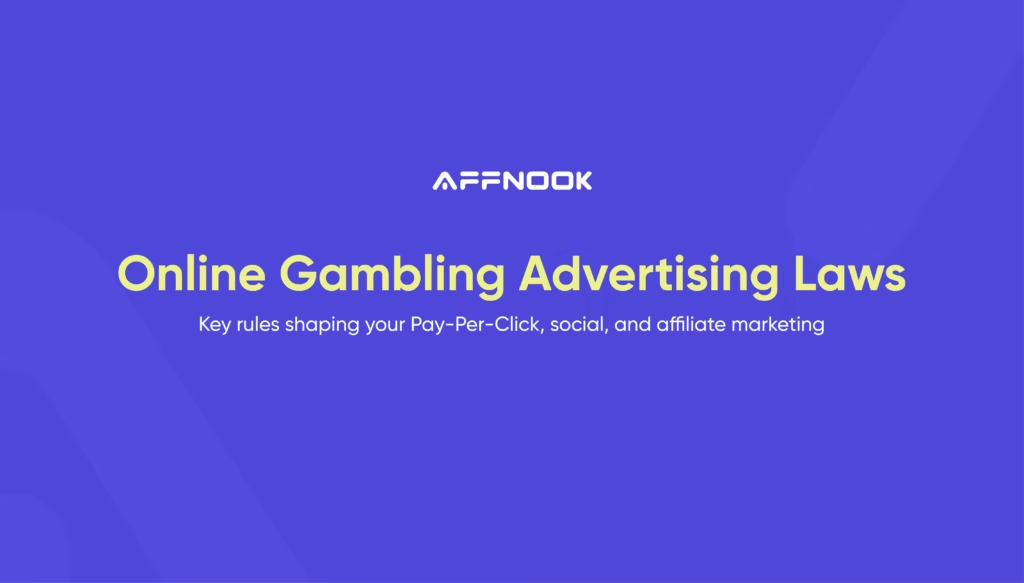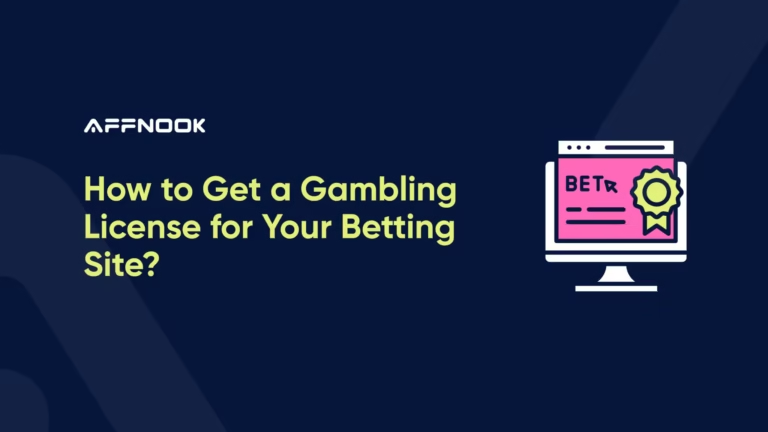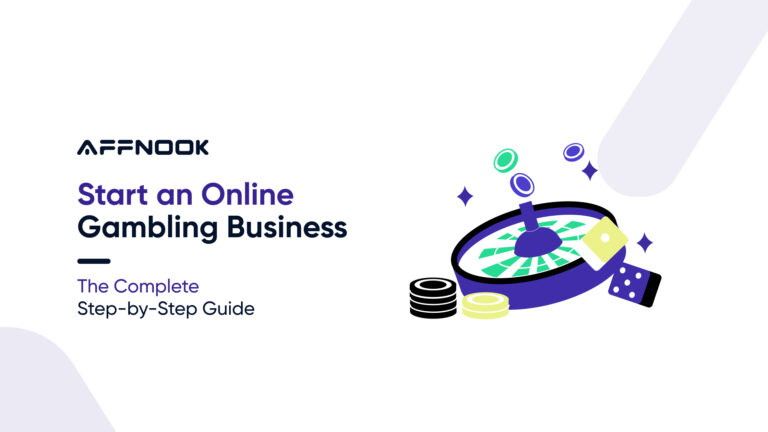Do you know if you make even one mistake with gambling ad rules, you could lose millions in ad spend — or even be banned from advertising?
This simple question bridges the gap between your ambition to scale your business and the complicated rules that control every ad you run. Whether you are an iGaming operator, marketer, or iGaming affiliate, knowing the changes in gambling advertising laws isn’t optional anymore — it’s a necessity.
Even though online gambling advertising laws are getting stricter, the industry is still growing. The global gambling market is expected to reach US$449.67 billion in 2025 and rise to US$510.16 billion by 2029, according to Statista.
In this article, you’ll explore what gambling advertising laws are, how they impact PPC, social media, and affiliate marketing, along with practical tips to help you stay compliant.
Understanding Online Gambling Advertising Laws
Gambling advertising laws are the rules and regulations that decide how iGaming operators can promote their services on the internet. These rules differ from one place to another, but share common threads:
- Age-restriction enforcement: Ad platforms make sure that gambling ads don’t reach people under the legal age (usually 18). They have to use tools like age filters and account verification to block underage users.
- Responsible gambling messaging: Many laws require ads to include clear warnings like Gamble responsibly and links to help or support services for people who might be struggling with gambling.
- Content restrictions: Some platforms ban certain ad content, such as overly exciting or misleading language, celebrity endorsements, free spins offers, or promises of easy wins that could encourage risky behavior.
- Targeting limitations: In some countries, such as the UK, Australia, and Spain, advertisers can’t aim gambling ads at groups who are more likely to have gambling problems. This includes avoiding certain demographics or interest-based targeting.
- Verification and transparency for affiliates: Affiliates (i.e, partners who promote iGaming brands) often have to clearly name the operator they’re promoting, include disclaimers, and sometimes send tracking or campaign data to regulators for review.
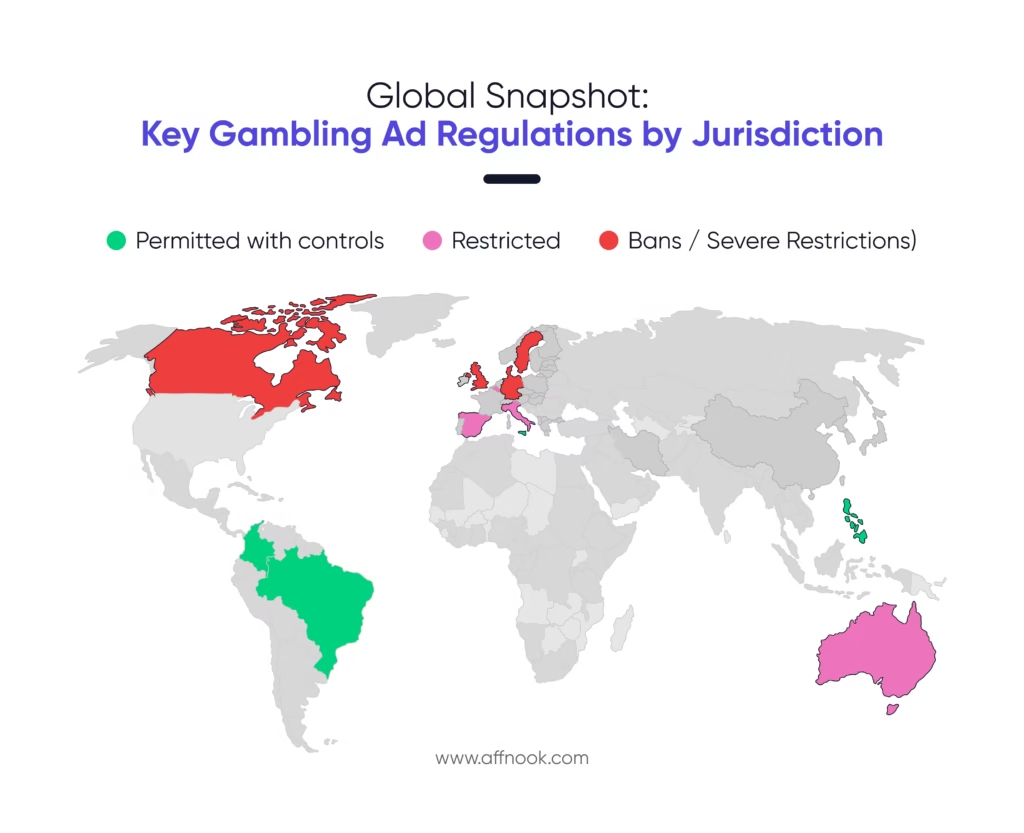
These rules have a major impact on three key digital marketing channels:
- PPC (Pay-Per-Click) – Platforms like Google Ads have strict rules for ad formats and keywords, limiting what you can promote and how.
- Social media – Channels such as Meta and YouTube may ban most gambling ads entirely or require strict controls on age, location, and content.
- Affiliate marketing – Affiliates may need to register with platforms, include mandatory disclaimers, and use tagged tracking links to show they meet compliance requirements.
Let’s Understand Pay-Per-Click Strategy Under Regulatory Constraints
For online gambling brands, search engine ads are a key source of traffic, but strict online gambling advertising laws regulate the keywords and ad creatives they can use.
Keyword bans – Google may block certain words or phrases like “safe betting site” or “free gambling bonus”, depending on local laws.
Geotargeting rules – Your ads can’t appear in regions where gambling ads are banned, even if people try to hide their location with proxies or VPNs.
Ad content requirements – Ads must clearly show age restrictions (like 18+ only) and include responsible gambling messages, all within the ad’s limited character space.
Best Practices for Compliant PPC
- Audit your keyword lists regularly against platform-approved terms for each market.
- Implement strong geo-blocking using IP or region filters, not just basic ad settings.
- Use short, clear responsible gambling notices like 18+ Gamble responsibly to meet legal requirements without overcrowding your ad copy.
- Monitor your ad accounts closely—platforms like Google can suspend them instantly for violations.
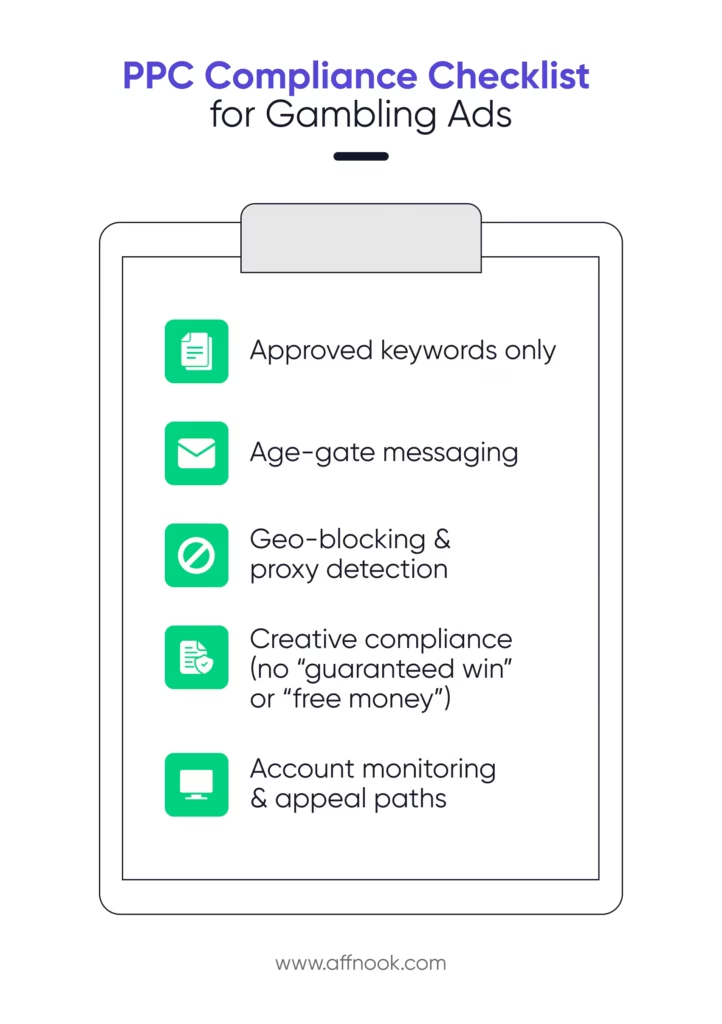
Let’s Understand Social Media Strategies in a Restricted Landscape
Social media might feel like the perfect place to connect with players — it offers unmatched reach, engagement, and precise audience targeting. But when it comes to online gambling, the rules here are even tighter than PPC.
Platforms like Facebook, Instagram, TikTok, and YouTube apply strict restrictions, and regulators worldwide closely monitor how gambling brands use these channels.
Unlike fashion or tech ads, gambling promotions face layered restrictions — both from the platforms themselves and from local laws. This makes compliance essential not only for avoiding fines but also for protecting long-term brand trust.
Key Social Advertising Restrictions
- Age Verification: Platforms like Facebook, Instagram, and TikTok require ads to be shown only to verified adults in approved regions.
- Creative Limitations: Ads can’t depict minors, promote gambling as a quick way to get rich, or use misleading incentives.
- Influencer Compliance: Influencers must clearly mark posts as ads and follow the same disclaimers as the brand.
Example: The Australian regulator ACMA recently warned social media influencers that promoting unlicensed offshore gambling services could lead to civil penalties up to AUS$2.5 million (approx. US$1.3 million), a potent reminder of regulation enforcement.
Social Media Best Practices
Work Only with Influencers Who Have Adult-Dominated Audiences
Partnering with influencers can expand reach, but in iGaming, compliance is critical. Always ensure influencers have a predominantly adult following to avoid exposing gambling-related content to underage users.
Brands should request audience demographics from potential partners and avoid collaborations where minors make up even a small percentage of followers. This not only keeps campaigns compliant with regulations but also protects brand reputation.
Add Disclaimers in Both Visuals and Captions
Clear disclaimers are essential in every post to reinforce responsible gambling practices and legal compliance. Phrases like 18+ Only, Play Responsibly, or “Terms Apply” should be placed directly on visuals as well as in captions.
This dual placement ensures that the message isn’t missed, regardless of whether the content is viewed as a video, image, or carousel. Consistent use of disclaimers also helps build trust and transparency with audiences.
Test Content with Platform Ad Preview Tools Before Launching
Since platforms like Meta, TikTok, and Twitter/X have varying restrictions on gambling promotions, testing content in preview tools before launch helps identify compliance risks early.
Previews show how the ad or post will appear to different audiences and flag potential violations. This proactive step reduces the likelihood of disapprovals, account bans, or wasted ad spend, and ensures smooth campaign rollout.
Let’s Understand Affiliate Marketing Under Tight Rules
Affiliate marketing is one of the biggest growth engines for the iGaming industry. From casino review sites to sports betting blogs and gaming influencers, affiliates bring in massive traffic by connecting players to casinos, sportsbooks, and poker platforms.
But when it comes to online gambling advertising laws, this channel is watched very closely. Affiliates are often treated as an extension of the operator’s own marketing team, which means they can’t use aggressive or misleading promotions like in other industries.
In fact, affiliates have to follow almost the same strict rules as licensed operators—sometimes even tougher ones. Regulators also hold operators responsible for what their affiliates say and do. That means if an affiliate runs a misleading bonus ad or uses a non-compliant landing page, it can put the operator’s license, reputation, and revenue at serious risk.
Key Compliance Areas for Affiliates
- Promote Only in Licensed Jurisdictions :
- Affiliates must target only those regions where the operator has a valid license.
- Running paid ads or SEO campaigns in unlicensed markets can lead to regulatory action against both the affiliate and the operator.
2. Mandatory Age Restrictions & Responsible Gambling Links
- Every landing page must include visible disclaimers like 18+ Only or Play Responsibly.
- Links to responsible gambling resources (such as BeGambleAware in the UK or Gambling Therapy internationally) should be easily accessible.
3. Transparent Bonus Promotions
- Affiliates must avoid exaggerating offers or leaving out essential terms.
- Example: If an operator offers a 100% match bonus up to $200, the affiliate must include wagering requirements, expiry limits, and other key T&Cs.
- Inflated claims (e.g., Free $200 instantly) can lead to ad bans and heavy fines.
4. Ad Content Restrictions
- Affiliates cannot present gambling as a solution to financial problems or glamorize it as a path to quick wealth.
- Any content targeting minors, students, or vulnerable groups is strictly prohibited.
Exploring New Promotional Avenues Beyond Traditional Ads
With mainstream platforms imposing strict Online Gambling Advertising Laws, iGaming brands are increasingly turning to alternative community-driven channels. Two of the most effective are Discord and Telegram, both offering unique opportunities to connect with players directly.
1. Discord: Building Interactive Communities
Discord is a powerful tool for creating private, interactive hubs where players can engage beyond traditional ads.
- Community Servers: Operators can build dedicated servers where members join topic-specific channels (game updates, betting discussions, live match threads).
- Exclusive Access: Offer VIP rooms for loyal players, where they receive special announcements, betting insights, or early access to promotions.
- Live Engagement: Discord’s voice and video features allow real-time Q&A sessions, watch parties for matches, or interactive contests.
- Moderation & Compliance: With custom moderation bots, brands can ensure conversations remain adult-focused and compliant with Online Gambling Advertising Laws by embedding responsible gambling messages.
Discord works best for fostering long-term brand loyalty by cultivating a sense of community and belonging.
2. Telegram: Fast, Direct, and Automated
Telegram’s strength lies in speed and automation, making it ideal for sharing updates and driving action.
- Broadcast Channels: Operators can send instant messages to large audiences without needing complex ad targeting. Perfect for bonus alerts, match reminders, or new game launches.
- Bots & Automation: Telegram bots can handle FAQs, deliver betting tips, or walk new players through onboarding—freeing up human resources.
- Private Groups: Brands can build smaller, invite-only groups where engaged players discuss strategies, share feedback, or participate in exclusive contests.
- Multi-Media Content: From infographics and short videos to polls, Telegram supports versatile content formats that make communication more dynamic and compliant with Online Gambling Advertising Laws.
Telegram is especially effective for real-time engagement and quick updates, ensuring players stay informed and connected without relying on paid ads.
Fraud Detection and Compliance Monitoring in Gambling Advertising
If you follow all the online gambling laws, there’s another challenge that can silently drain your marketing budget: fraud.
In the iGaming space, fraud doesn’t just come from shady players; it can come from affiliates, fake traffic sources, or even manipulated ad campaigns. This is why iGaming fraud detection is now a critical part of any online gambling advertising strategy.
Types of Fraud in iGaming Advertising
1. Affiliate Marketing Fraud
iGaming platforms often rely on affiliate campaigns to drive player acquisition, but these are fertile ground for several forms of online gambling fraud in advertising:
- Fake Traffic (Bots or Data Centers)
Fraudulent affiliates generate massive volumes of clicks using bots or cloud-based data-center traffic to falsely elevate performance metrics and earn commissions without genuine user engagement. - Fake Conversions
Artificially generated sign-ups or registrations, achieved through bots, multiple fake accounts, VPN manipulation, or even AI, to trigger conversion events and unlock affiliate payout. - Multiple Account Creation
A single user (or bot) creates numerous accounts via an affiliate link, fabricating conversion volume. VPNs and duplicate payment credentials are common indicators. - Commission Cheating
Affiliates manipulate tracking mechanisms, either altering another affiliate’s tracking codes or fabricating users to illegitimately claim credit. - Affiliate Hijacking
One affiliate covertly takes over another’s tracking link or injects malicious scripts, enabling them to receive commissions meant for their competitor.
2. Player-Driven Fraud
These deceptive behaviors originate from users themselves rather than the affiliate network:
- Bonus Abuse
Players exploit signup, deposit, or Free-Spin bonuses, e.g., by creating multiple identities/accounts or exploiting ambiguous bonus terms to withdraw funds without satisfying wagering conditions. Accounts for over 65 % of fraud cases. - Identity Theft (Forgery & Fake KYC)
Fraudsters bypass identity checks using forged documents, stolen credentials, or synthetic identities to deposit and withdraw funds in others’ names. Over 50 % of such attempts involve forged documents. - Chargeback Fraud (Friendly Fraud)
Users dispute legitimate deposits or bets post-loss, prompting chargebacks. They may claim unauthorized activity, causing financial loss, plus chargeback fees for the operator. Represents over 5 % of iGaming fraud cases. - Money Laundering
Fraudsters exploit casinos to launder funds using structuring (“smurfing”), rapid deposits/withdrawals, anonymous payment methods (cryptocurrency, prepaid cards), VPNs, or minimal gameplay as red flags.
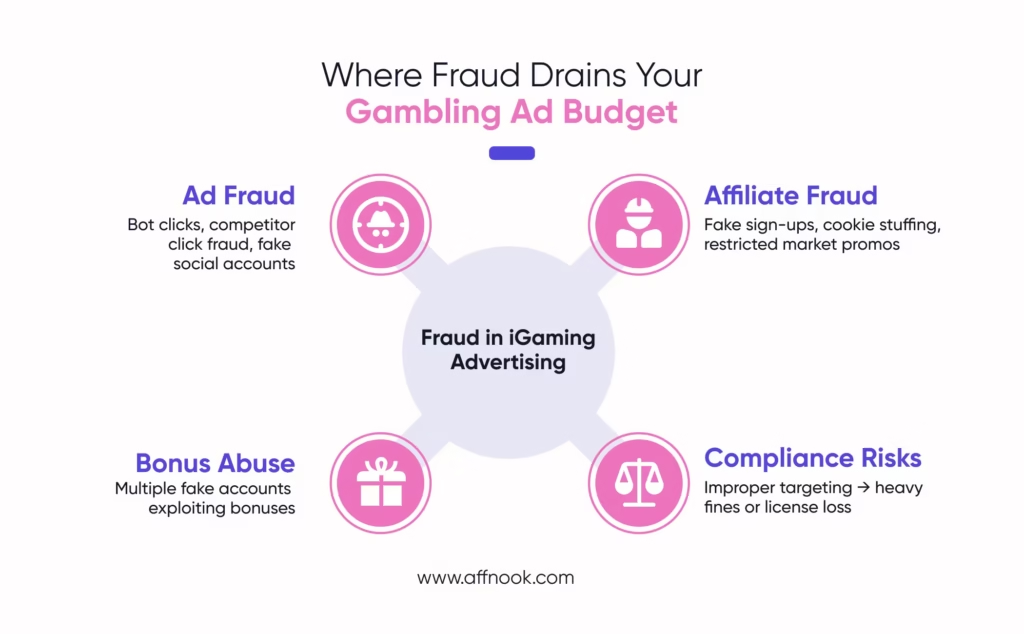
How Fraud Impacts Compliance
Fraud isn’t just about lost money; it can actually push your business out of compliance with online gambling advertising laws:
- Illegal traffic: If affiliates send users from regions where your gambling license isn’t valid, regulators can fine you, even if you didn’t directly target that market.
- Misleading offers: Affiliates promoting inflated bonuses for higher conversions put you at risk of being flagged for false advertising.
- Data manipulation: Fraudulent campaigns make it harder to maintain transparent tracking and reporting, which regulators often require for gambling ads.
Best Practices for Fraud Prevention
- Collaborate with trusted affiliate networks: Instead of onboarding random affiliates, work with reliable platforms that follow compliance-first practices. Their built-in monitoring helps identify suspicious activity early, protecting your campaigns.
- Leverage fraud detection software: Use advanced tools to block bot traffic, flag unusual sign-ups, and track irregular campaign performance. With Affnook’s built-in fraud detection capabilities, operators can easily spot suspicious activity in real time and take quick action to protect their campaigns.
- Audit affiliates regularly: Request campaign reports, review traffic sources, and ensure that every promotion includes the required disclaimers.
- Monitor bonus abuse: Apply KYC (Know Your Customer) checks to prevent multi-accounting and enforce wagering requirements clearly.
- Automate compliance checks: Use tools that scan your affiliates’ landing pages for age restrictions, responsible gambling links, and transparent T&Cs.
Conclusion
Online gambling advertising laws shape every aspect of your digital marketing, from PPC campaigns and social media ads to affiliate partnerships. Compliance isn’t just a regulatory requirement; it’s the foundation of protecting your ad spend, safeguarding your license, and building long-term brand trust.
By following best practices like using responsible messaging, restricting targeting, auditing affiliates, and applying fraud detection operators and marketers can stay compliant while still driving growth. In an industry where a single violation can cost millions, playing by the rules isn’t a limitation; it’s your most powerful strategy for sustainable success.
Help Section
What are online gambling advertising laws, and why do they matter for iGaming operators?
Online gambling advertising laws regulate how operators promote their services across PPC, social media, and affiliate channels. They matter because compliance ensures operators avoid hefty fines, ad bans, or license risks. Following these laws also helps in building trust with regulators, affiliates, and players, protecting long-term brand reputation and marketing ROI.
How do online gambling advertising laws impact PPC campaigns on Google and Bing?
Gambling advertising laws directly affect keyword targeting, ad copy, and geotargeting in PPC campaigns. Platforms like Google and Bing only allow licensed operators in approved markets, making compliance mandatory. Non-compliance can lead to rejected ads, wasted budgets, or permanent bans, so aligning campaigns with regulations is essential for sustainable performance.
What restrictions do online gambling advertising laws place on social media promotions?
Social media platforms enforce strict rules around gambling promotions, often requiring age-gating, license verification, and country-specific compliance. Online gambling advertising laws restrict ads from targeting underage users or unregulated markets. Operators must balance engaging creatives with strict platform policies to avoid account suspensions, ad rejections, or reputational harm while running compliant campaigns.
How do affiliate marketers adapt to changing online gambling advertising laws?
Affiliate marketers adapt by tailoring campaigns to regulated regions, avoiding restricted markets, and ensuring transparent tracking. They also update content to meet compliance guidelines, such as adding responsible gambling disclaimers. Stronger partnerships with operators, supported by fraud detection tools and real-time monitoring, help affiliates stay compliant while still maximizing traffic and conversions.
What penalties can operators face for violating online gambling advertising laws?
Operators who violate online gambling advertising laws risk severe consequences such as heavy fines, license suspensions, or permanent advertising bans. In some jurisdictions, regulators can blacklist operators from running future campaigns. Non-compliance also damages player trust and affiliate relationships, making strict adherence to laws crucial for sustainable growth in the iGaming industry.
